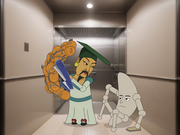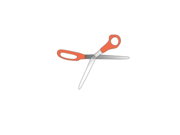Mnemonic comic for 有
Translation
Mnemonic
Comments
有 is one of the characters where it is extremely hard to find a good mnemonic symbol: "to have" is an abstract concept without any object associated with it. But fortunately, "to have" is such an abstract concept that a mnemonic is not needed to associate the character's pronunciation "you3" with the meaning "to have".
有 is serving as a component for many important characters. In order to make learning these other characters easier, we assign an arbitrary mnemonic symbol to 有, derived solely from its components. 有 looks like a pair of scissors cutting into the moon, so we imagine the moon being cut into thousands of tiny pieces of confetti. This way, whenever 有 is used as a component of another character, we can use the mnemonic symbol "confetti" to remind us that we need to include 有 when writing any of these characters.
Matthias, 6 months ago




